But all this, as well as the number of participants - 1200, does not say much about quality. But a survey of these same 1,200 participants says. The reports that the participants rated above all speaks of a variety of relevant topics and how our community and industry are developing.
I propose to view three completely different reports from the TOP 10:
- Two extremes of the leader / Alexander Orlov.
- Are you sure you are not a micromanager? Egor Bugaenko.
- This is beneficial: why do we need more female programmers? / Andrei Breslav.

Two extremes of a leader
Alexander Orlov is the managing partner and trainer of the Stratoplan School of Managers on work with people and managerial skills. If you just get into the role of a leader and somehow it happened that you didn’t see any of his speeches, be sure to look at this and a couple more from the Internet available on the open spaces.
Guest reviews of the conference show why the report is in the top and why it is better to listen to the whole.
“I liked both the presentation and the content. Thoughts beyond the usual. "The speaker managed to engage in a context that was later reflected in listening to other reports.”
“The author was able to describe my feelings about working as a team leader, and I recognized myself at some points. A useful view from the side to rethink your behavior and work on it. ”
This is the case when thoughts are not that innovative, but lively, sometimes grotesque examples help to finally draw attention to them. But for those who always spare time for their own development, I’ll retell the main one - maybe this will serve as an incentive to think and break the career deadlock.
In Stratoplan, Alexander Orlov talks with a bunch of managers at various levels. Therefore, it can put forward hypotheses not only based on their experience, but also test them with the help of school students.

The material for this report of Alexander was a survey: "What makes you bomb at work?" It turned out that, firstly, any working situations in someone cause a storm of emotions, and secondly - different people are irritated by different aspects of the same situations.
Two types of people can be distinguished depending on what they do not like more: incompetence or inattention to people. Alexander called the first excellent students, because for them the main thing is technology. And the second - the good guys, because they want to be good for everyone, and when someone does not consider others, it annoys them.
In a world where technically savvy technical students are valued, the best programmer becomes a team lead. Who then believes that the work needs to be done either well or not at all. An excellent student is touched by weaker subordinates who cope with work worse than him.
For good people, the opposite is true - the one who can get along well with people becomes a team lead. For him, conflicts in the team is a serious problem, and a situation where someone runs into colleagues can turn into a serious drama. Good guys love DeMarco and Spolsky’s books and are responsible for how to make programmers good.
Quote without comment: "A programmer is a creature that doesn’t kiss wherever, everywhere is an ass."
It would seem that the approach of excellent students and good guys to management is completely different, and they will face completely different problems, but in reality the consequences are very similar. Both begin to process, quickly depreciate people, do not give themselves the right to make mistakes ...
And then the career plateau opens. What at the initial stage helped to grow (task orientation or people orientation), it also starts to stop. Then you need to change something, for example, follow the advice:
- Tip number 1. In order not to be disappointed, one should not be charmed.
- Tip number 2. Give people a second chance.
- Tip number 3. Ask questions - the meaning depends on the context.
These are good, universal tips, but they will not work . We all have a personality structure, and many events in our life have led to the way we communicate. Go apply in real life a great tip to listen calmly while the customer yells.
To change habitual behavior, it is necessary that new unusual synoptic connections form. For this you need to constantly excite other areas of the brain. This will be unpleasant, you will need to constantly put yourself in uncomfortable conditions, in fact, act against your personality. But until you start, you won’t start.
Alexander advises three approaches to working on his personality: self-reflection (reading books, attending conferences), group work, work with a specialist (psychotherapist, coach). In general, this can be reduced to the thesis of being interested in yourself, and any method will do.
“The report in Orlov’s traditional style is to stick a shovel deeply, but not dig, but leave it that way. The very idea is very rich, relevant, leads to a bunch of thoughts. And it’s even right that there can be no practical conclusions, except “Be attentive to yourself”, ”recalls the conference participant.
Are you sure you are not a micromanager?
Egor Bugaenko is a speaker with whom many want to disagree. So it is conceived. The point is to make you think again. And if you can give good, at least for yourself personally, arguments, then it’s already good. Even if your views do not change, awareness will increase.

For starters, you can quickly, without registering and SMS, be diagnosed as a micromanager. Egor proposed a test of six questions for this, which must be answered from the position of team lead or PM.
1. One of the worst programmers in terms of performance is asking you if he can work from home today. You'll answer:
- a) Of course not.
- b) You can, but promise me ...
- c) Yes, please, why ask at all.
2. You noticed that one of your developers is watching youtube, although the nose is deadline. You:
- a) Ask what he is doing.
- b) You decide to talk to him later.
- c) Join him.
3. You are gathering a meeting, but the designer says that she does not have time and she will not come. You:
- a) Demand to attend anyway.
- b) Say that discuss her behavior and attitude to the meetings later.
- c) Say: "And for $ 50?".
4. The new developer in your team does not fit into the second important deadline for no reason. What will you do?
- a) Ask for more future reporting on work.
- b) Get fired.
- c) Increase.
5. You have found that a programmer from your team is performing a task from another team. What will you do?
- a) Ask to stop immediately.
- b) Understand what kind of task it is.
- c) Go to the team leader of that other team and ask them to teach you management.
6. The DevOps engineer from your team complains that he learned that his salary is lower than that of the programmers in your team. What will you do?
- a) Promise to increase the salary.
- b) Raise your salary immediately.
- c) Offer him to become a programmer.
Calculate the result
Calculate yourself:
- 4 points for each answer from: 1b, 2a, 3b, 4a, 5b, 6a.
- 1 point for each answer from: 1a, 2b, 3a, 4b, 5a, 6b.
- 0 points if you have chosen option c.
You are a micromanager if you score more than 8 points.
And then you need to look at the whole report and find out why this or that behavior can be regarded as micromanagement.
Conference participants, as one would expect, do not agree on everything. But recommend viewing.
“The report is very ambiguous, I want to argue with it, but the author himself rightly said that if you agree with the speaker 100%, then you made a mistake in the report. A lot of food for thought, served in a rather provocative form. It should be considered as a good start for self-training on this topic. "
“Very hype, it was fun and made me think. Contradictory Report. ”
“The speaker speaks very well and skillfully asks a discussion of provocative questions, like. “And what matters to the manager, what time do I watch YouTube? Maybe I need to see YouTube now ... "".
This is beneficial: why do we need more female programmers?
From the name it is clear that the topic will be complicated. After this performance, we even had a long Facebook thread and Ontiko’s official position on diversity was born. The report of Andrei Breslav was highly constructive. His background was also developed by Kotlin, a co-founder of a startup about psychotherapy, teaching at schools and universities, and the skill of speaking.
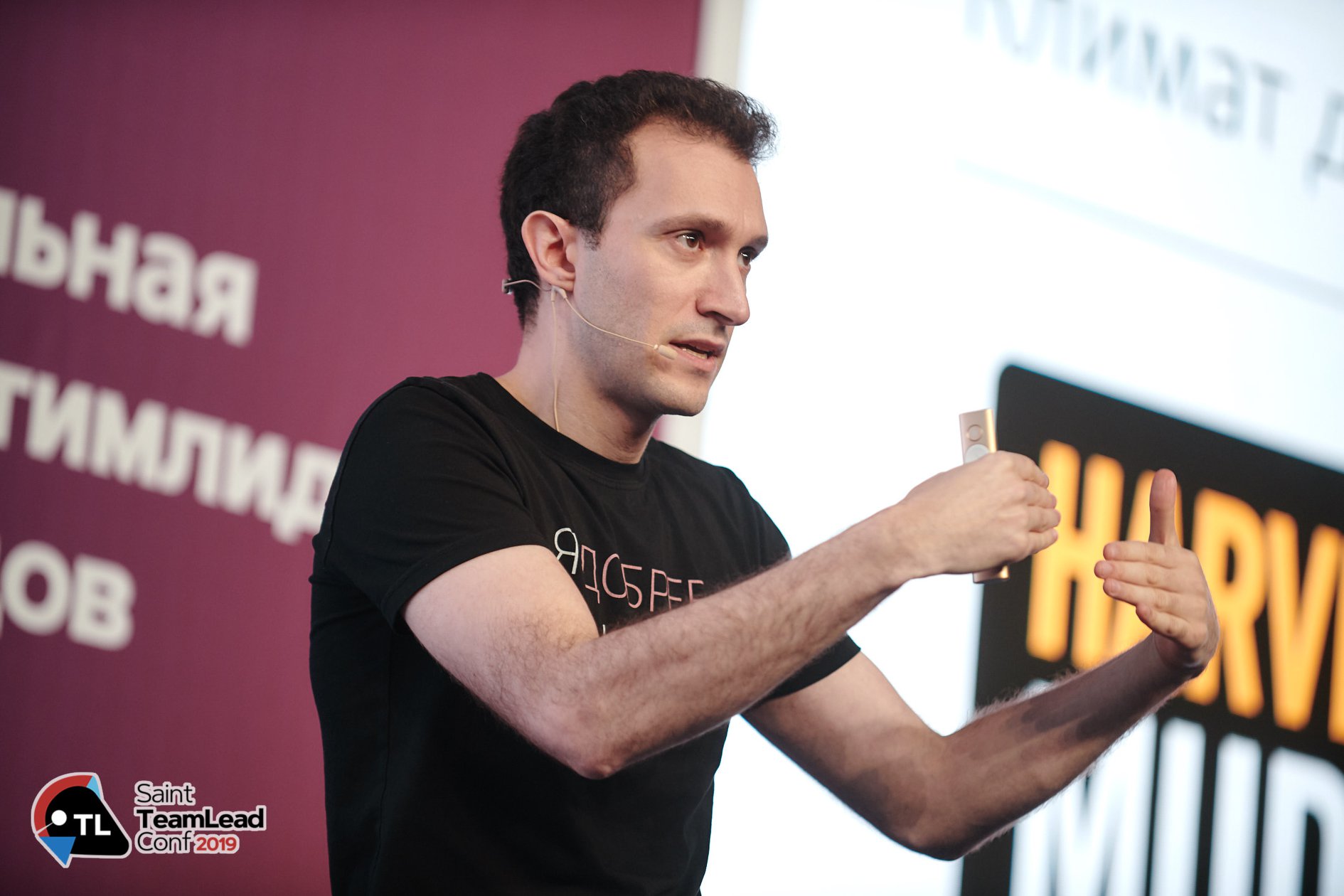
As a true technical specialist (who, by the way, also performs well on non-technical topics - look, for example, his report on empathy ), even starting a social report, Andrei offers a plan diagram. If everything is clear to you on it or just uninteresting, then wind the post further.
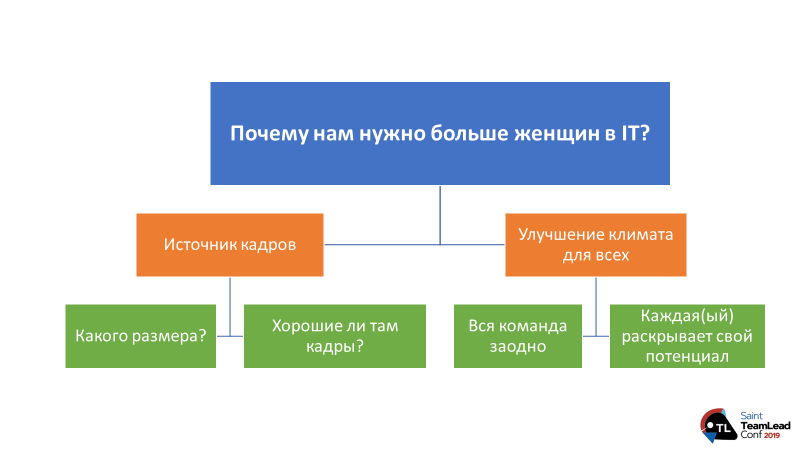
Obviously, any conversation about gender differences risks inadvertently slipping into a holivar. This happens especially quickly when one of the two types of argument appears: moral and ethical or political. This is also important, but this was not the case in this report. Andrei came up from a different angle - he tried to show that he was uniting, not disconnecting. And as the common interests I chose economic - the search for personnel and labor productivity.
Community hooked:
“The report was the start of a huge discussion the next day. A positive discussion with pleasant personal and social findings. ”
"An unusual look at the problem of staff shortages in the industry."
“The best report at the conference. I don’t even know what is more important to note - the cleverest speaker, the most important and sharpest topic or a smart presentation. ”
“The speaker is aware of the latest research, professionally avoids dangerous topics and helps to take a huge step towards equality, including in IT :)”
And this is good, because in this case, changes are needed in the industry as a whole. If everyone joins, the labor market will be better for all of us - there will be more people on it and they will work better.
Now, it seems that industry growth is limited by the growth rate of the labor market. In specific figures, we could grow by another 44%, if in IT the ratio of men and women would be like the average for the working population of the country. And this Andrei still focuses on JetBrains, where 25% of women work on technical projects, which seems like a very good indicator.
The counterargument is the first - or maybe this is not valuable personnel. The short answer is no.
Nobody offers to bring to absurdity. Of course, there are physiological and cultural differences. And even there is some scientific evidence on how they correlate with certain abilities. Here, for example, is the conclusion of one study: men, on average, cope with the test for spatial thinking better than women at 0.73σ (standard deviation).
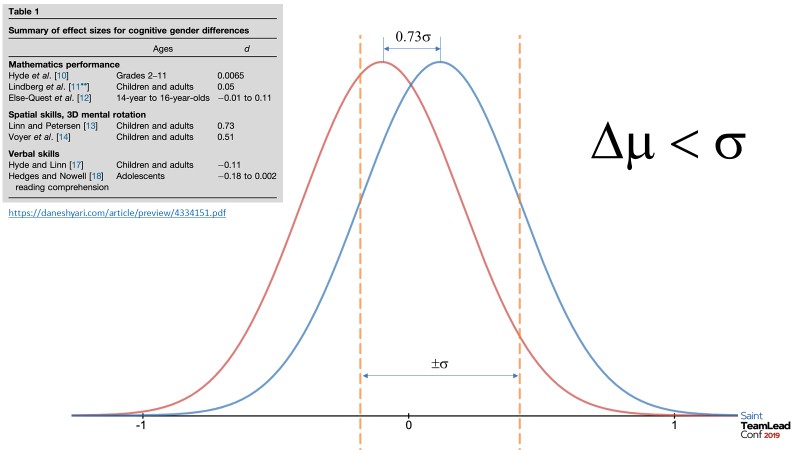
This is the biggest difference that was found. That is, if you hire the best people from the point of view of this test, then there are significantly more men suitable for you than women. But if we talk about the average value, then a large number of people of both sexes correspond to it.
Even where differences are scientifically validated, they do not affect hiring.
Individual differences within a group, that is, between different men or between different women, are significantly greater than intergroup differences.
Thus, it is inevitable whether you agree or not, the proportion of women in IT will grow, and in 5-10 years the following changes will occur:
- behavioral changes;
- values are being liberalized.
This means that it is time to start preparing so that after 5 years it doesn’t work out that your hiring competitors have overtaken you very, very much.
OK, what to do? Globally, the problem needs to be back in school. In the fifth grade, girls and boys at the olympiads in mathematics, physics and computer science are about the same, and in the seventh there are already fewer girls, then this skew only increases. Only large companies and funds can afford it. For example, JetBrains award those who trained girls for the All-Russian Olympiad in mathematics, physics and computer science. Perhaps this will have an effect on prejudice.
But in our companies, we can start with simpler things and at least minimize disunity related to gender characteristics. And the story of men's handshakes, and the rule to stop swearing when a woman enters, lead to separation, separation, and are bad for integration into the team.
But in addition, there is a wide range of measures that are not related to sex. They will generally improve the climate, but maybe this will be especially important for women.
If you succeed in your company:
- beginners compared themselves to beginners;
- employees understood that their results and their status depended on how they work and how they request assistance;
- everyone had equal access to the attention of the leader and others;
you allow a wide circle of people to reach their potential. Even if not a single woman is working for you, it will help men who do not feel very confident.
What else can help:
- Show positive examples.
- Use feminitives (it sounds so-so, but they say you can get used to it).
- Call and send women to speak at conferences (here is our Call for Papers , if that).
In questions after the report there is still a lot of curious, for example, “Survivor's mistake” in the comments of the women present. Therefore, start acting according to the simple tips above, and bookmark the video yourself - you don’t want to be left behind in the race for resources.
What else did the conference remember
For example, unheard of interest in mitaps. We identified large audiences for mitaps - such a platform, everything is big. But what to listen to Phil Delgyado about how to conduct an interview in 15 minutes, so many people will come, we somehow did not expect.

Next time we take into account and immediately prepare the microphones. And not everyone can speak as loudly as Yegor Tolstoy and Stas Tsyganov about the roadmap of the team leader - they also had a full house.

This is despite the fact that at the same time a three-hour (!) Workshop by George Mogelashvili on Performance Review began. Registration for it was in advance and closed before the start of the conference, and some people who did not get into the first 25 people came at least to listen. More details can be found in the article by Anton Kosterin.
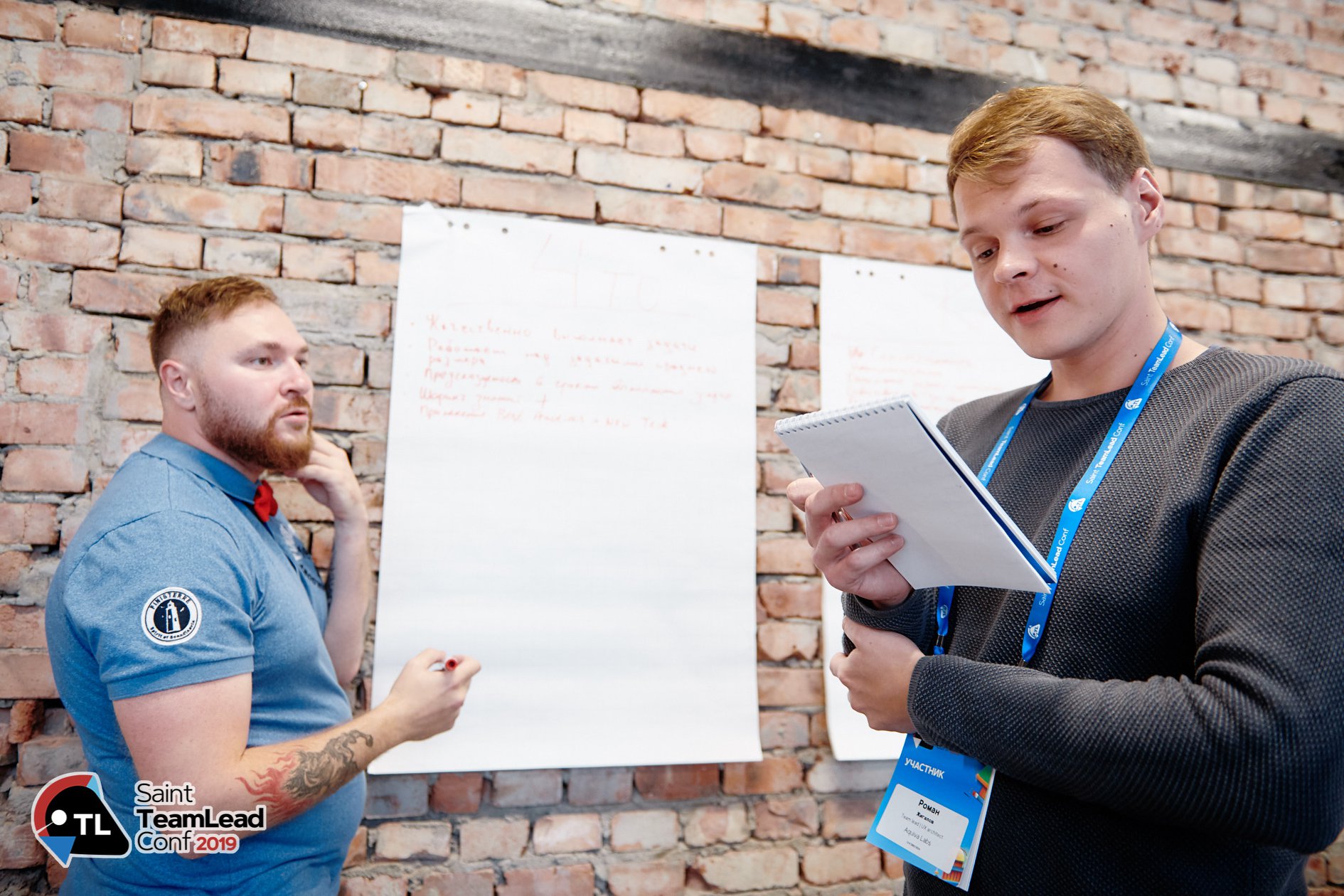
The expert and discussion zones worked out with a bang. Alexandra Ziza, as always, was not released for another hour and a half. His report on toxicity in team work will soon be published in full text, because it seems to have touched the living. In any case, in our chat room now is the day when toxicity was not mentioned, consider it was in vain.
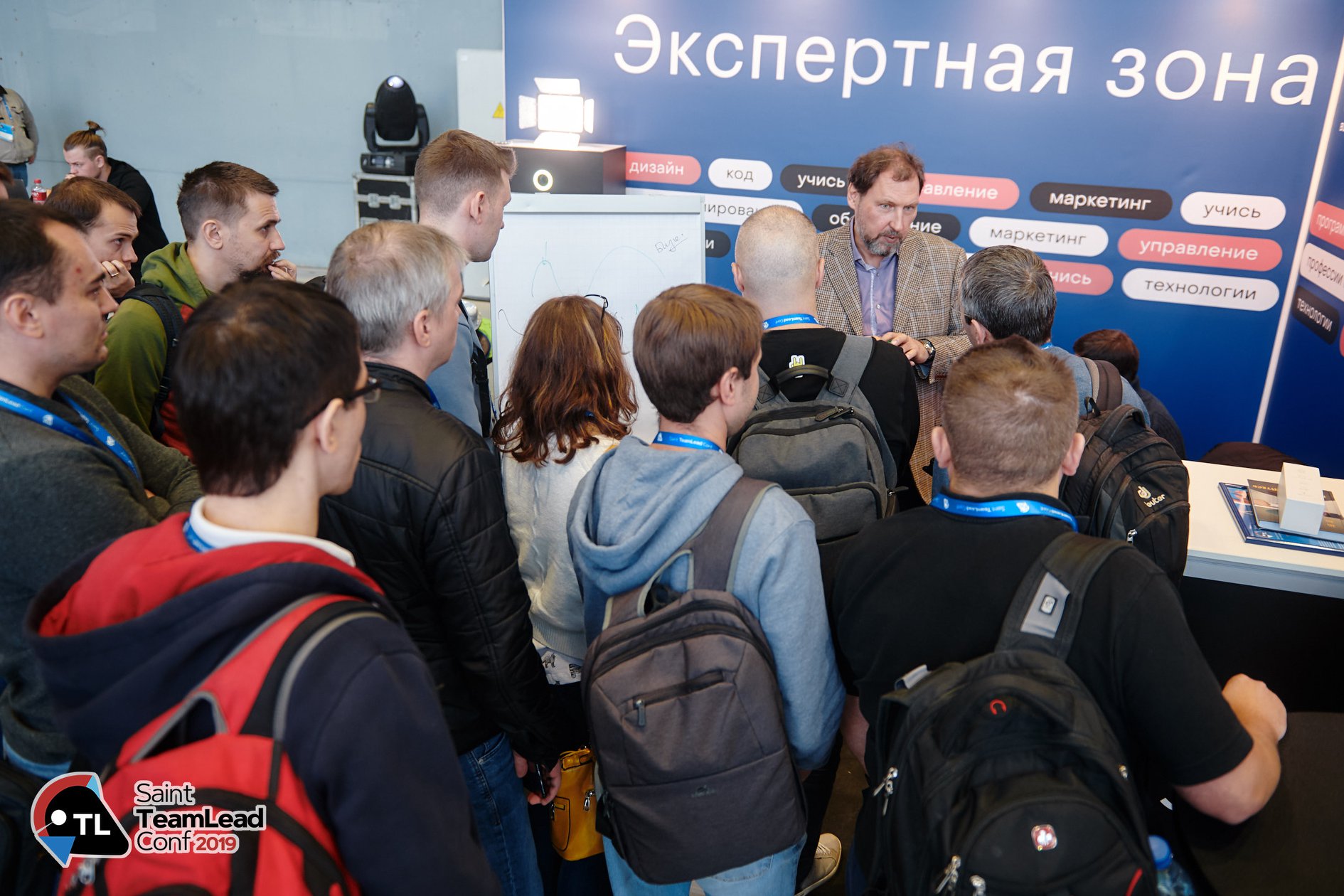
While we are preparing articles on other interesting reports and have not posted the video in the public domain, look at the notes of Maxim Tsepkov. From there you can grab valuable ideas for self-development.
What's next
Further more. We’ll take into account the feedback, promote posts and discussions in the relevant community, ask everyone who we reach out to, and determine where the industry is moving and what topics to discuss further.
So far, such a picture has been drawn of key topics for TeamLead Conf 2020 :
- Adjacent areas for team lead. What is worth pumping, and what not to touch until a certain point? Do I need to be a little HR or not? Is it worth it to study psychology? Do you need to know the subject area, or can you simply code and distribute tasks.
- Intangible motivation. Approaches, areas and limits of applicability.
- Planning Approaches. Strategic and tactical planning, incident wave method, Gant, etc.
- Career. From team lead to architect, development manager, service station. Or, for example, in an adjacent area. The stories of those who passed and those who just crossed the line. Or maybe those who came back.
- Setting up processes within the team and between teams. Review, work with technical debt, screwing up Scrum, everything related to processes, but only in the context of practical scenarios.
- Rumor has it that OKR began to be introduced with or without, but no one really succeeds. Avito has already performed, they succeeded, but this is only one point of view.
- Agile Suddenly. But many write that they would like to hear about it. LeSS, SAFe, non-standard cases Scrum, Lean, Kanban and more.
Call for Papers is open until December 22, but the advantage is given to those who have filed earlier. Therefore, think about the topic, follow the news and the newsletter, see you in February 2020 in Moscow.